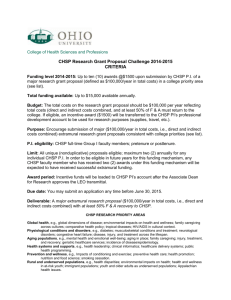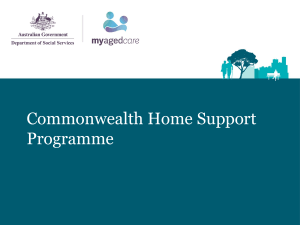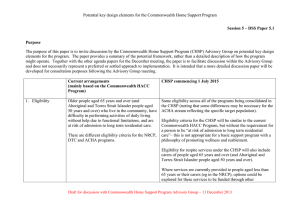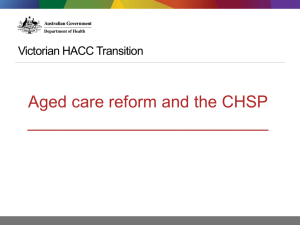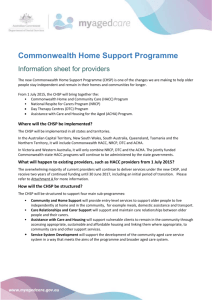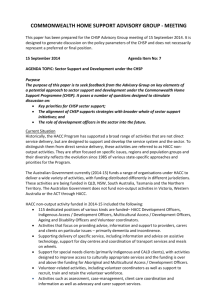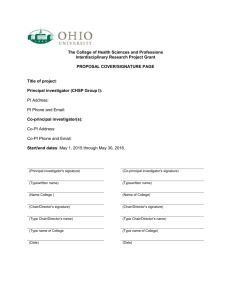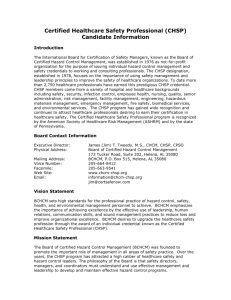Insert presentation title here - Department of Social Services
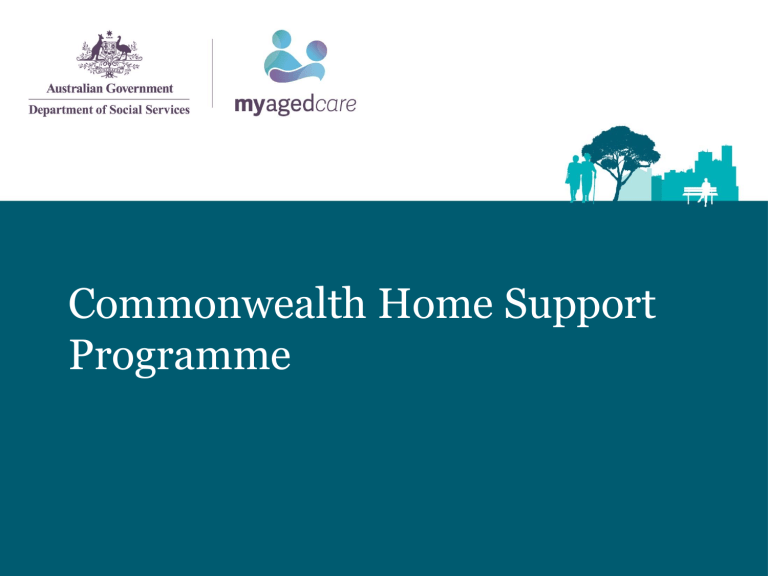
Commonwealth Home Support
Programme
Today’s Presentation
Module 1
• Introduction to the CHSP – what are we trying to achieve?
• Recap of the development process
• Entry and assessment through My Aged Care
• Consultation opportunities - Manual, Fees and
Restorative Care Approaches
Module 2
• Operational detail of the programme
• Implementation timelines
• Next steps
Introduction to the CHSP
Highlights of the CHSP
• 2015-16 will represent $1.7 billion funding per annum
• Continued support to over 550,000 older Australians
• Will address fragmentation of current aged care system which is:
• complex for providers to operate
• difficult for consumers to navigate
What it all means
What it means for clients
• Continuity of care and support
• streamlined entry-level support services
• Entry and assessment through My Aged Care
• support with a restorative approach (incorporating wellness and reablement)
• equity and sustainability through a national fees policy
What it means for providers
• Lots of stability including continued funding for majority of providers and continuity of care for existing clients
• Reduced red tape for providers by streamlining funding arrangements
CHSP does not currently apply to HACC services in Western
Australia and Victoria
Development Process
Key Inputs
Expert advice from NACA
Commonwealth HACC
Service group reviews
Review of respite arrangements
Sector feedback on the
Discussion Paper
Key Outcomes
Programme position
Programme philosophies
Programme framework
Access to the CHSP and interactions with other programmes
Post Discussion Paper
Key design changes since the Discussion Paper:
• Introducing a transition period to support transition to the
CHSP
• Describing CHSP services as ‘ entry level ’ rather than
‘basic’
• Support for grandfathering arrangements for existing clients
• Programme Framework based on target groups not outcomes
Positioning of CHSP
Home Care Package (3&4)
High intensity care at home
Home Care Package (1&2)
Low intensity care at home for clients with more complex needs requiring ongoing care coordination and/or case management
Flexible Care Residential care
Commonwealth Home Support Programme
Low intensity entry-level support at home
Short-term restorative care
Ongoing services for clients and/or carers
My Aged Care
Identifiable entry point, providing consistent information, starndardised assessment procedures and linking service capability
Programme Philosophies
Restorative Care Approaches (including wellness and reablement)
• Three different yet complementary methods of intervention
• The CHSP Good Practice Guide will help providers understand and implement concepts
Consumer direction
• Works in partnership with a wellness approach
• Empowers individuals to take charge of decision making about their care and services
• Does not provide individual budgets
Structure of the CHSP
The CHSP is structured around four main subprogrammes based on target groups:
• Community and Home Support
• Care Relationships and Carer Support
• Assistance with Care and Housing
• Service System Development
Sub - Programmes
Sub - Programmes
Sub - Programmes
Sub - Programmes
Special Needs Groups
• CHSP special needs groups align with the Aged Care Act
1997
• Care and support of people with dementia is core business for all providers
Entry and Assessment
New capabilities of My Aged Care
• Entry and assessment for new clients to the CHSP through My Aged Care
• Reassessment of existing clients through My Aged Care only if significant change in care needs
• Service level assessment will remain the provider’s responsibility
Consultation Opportunities
Programme Manual
CHSP Fees Policy
The CHSP fees policy will aim to:
• provide a fairer, nationally consistent framework for the collection of fees
• ensure clients make a contribution to the cost of their care based on their capacity to pay
• have appropriate safeguards for those least able to contribute to the cost of their care
• address the financial disincentives for clients to move to a different programme better suited to meet their care needs
Good Practice Guide
• The CHSP Good Practice Guide will help providers understand and implement wellness, reablement and restorative care concepts
• The Guide is available on the Department of Social
Services website at www.dss.gov.au/chsp for your feedback.
• Feedback closes mid-April 2015.
Questions
Operational details of the CHSP
Most operational changes are line with DSS’s new way of working for grants including:
• Quality
• Reporting
• Funding/Flexibility
Operational details of the CHSP contd.
Operational details of the CHSP contd.
Reduction in Red Tape
Transition period
Commonwealth Home Support Transition Period commences from 1 July 2015:
• Majority of existing agreements will be extended to
31 October 2015
• Existing guidelines and manuals for the Commonwealth
HACC Program, NRCP, ACHA and DTC will continue to be used during this transition
• Providers will receive more information shortly
What do providers need to do?
• Continue to deliver services in line their existing agreements
• Talk to their grant manager if they have any questions
CHSP Grant Agreements
Establishment of new CHSP Grant Agreements
•
• We will work with you to establish agreements to commence from 1 November 2015 – 30 June 2017
From 1 November, you will must comply with:
Grant Agreement & terms and conditions
CHSP Programme Manual & Guidelines
What do providers need to do?
• Follow advice received in coming months
Where to from here?
More Information
Available at the Department of Social Services website at www.dss.gov.au/chsp
Questions


